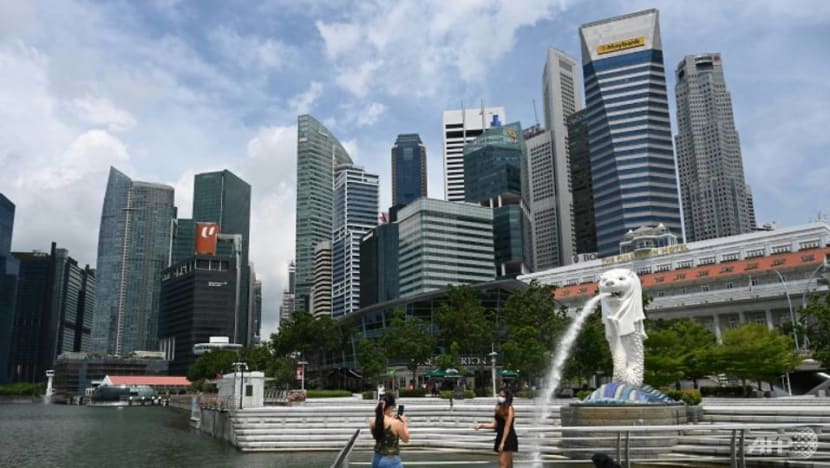Singapore's core inflation in July rose at its fastest pace in two years

A view of the Singapore skyline from Merlion Park. (File photo: AFP/Roslan Rahman)
SINGAPORE: Consumer prices in Singapore continued to rise in July, driven by higher electricity and gas costs, data on Monday (Aug 23) showed.
This is the sixth straight month that Singapore's core inflation has remained positive, and it rose by its fastest pace in two years.
Core inflation edged up to 1.0 per cent year-on-year, an increase from 0.6 per cent in June, according to data from the Monetary Authority of Singapore (MAS) and Ministry of Trade and Industry (MTI).
This is highest since June 2019, when it rose 1.1 per cent.
The headline consumer price index (CPI), or overall inflation, rose 2.5 per cent year-on-year, from 2.4 per cent in June. This is driven by an increase in inflation, higher accommodation and food costs, as well as a smaller decline in the cost of retail and other goods.
RISE IN ELECTRICITY AND GAS, ACCOMMODATION AND FOOD PRICES
Electricity and gas costs rose at a higher pace due to the low base in the third quarter of last year when energy tariffs had fallen sharply following the collapse in global oil prices.
Electricity and gas prices rose to 9.9 per cent in July, reversing the -1.8 per cent decline in the previous month.
"On a year-on-year basis, the electricity tariff rose by 19.3 per cent in July, while the gas tariff increased by 12.9 per cent," said MAS and MTI.
The cost of accommodation saw an uptick to 1.4 per cent, up from 1.1 per cent in July, due to larger increase in housing rents.
Food inflation also rose to 1.1 per cent, from 0.9 per cent in July, on the back of higher non-cooked food prices.
FALL IN RETAIL, SERVICES AND PRIVATE TRANSPORT COSTS
The cost of retail and other goods fell at a slower pace in July by 1.2 per cent year-on-year, mostly due to the smaller decline in the price of clothing and footwear.
Services costs edged down to 1.3 per cent in July from 1.4 per cent in June. This is on account of the decline in telecommunication service fees, said MAS and MTI.
Private transport inflation also fell to 12.6 per cent in July, from 14.9 per cent the previous month, primarily driven by the smaller increase in car prices.
CORE INFLATION TO INCREASE, DAMPENED BY COVID-19 UNCERTAINTY
MAS and MTI said external inflation has remained elevated amid the passthrough of higher oil prices and cost of intermediate goods to final consumer prices.
"These upward pressures on global inflation should ease over the course of the year," said the authorities, adding that crude oil prices have moderated recently alongside higher oil production.
"The supply‐demand mismatches in some goods markets, as well as bottlenecks in global transportation, are mainly transitory and should ease with the gradual normalisation of production," said MAS and MTI.
Continued negative output gaps in some of Singapore’s key trading partners should help to moderate Singapore’s overall import price inflation, said the authorities.
As Singapore transits to a virus‐endemic state, lingering uncertainty could weigh on consumer sentiment and dampen domestic price increases in the near term, they added.
"Wage growth should continue to be restrained as the slack in the labour market, while diminishing, will take time to be fully absorbed", said MAS and MTI, adding that commercial rents are projected to stay low, capping overall business cost pressures.
"In comparison, private transport and accommodation costs should remain resilient on the back of firm demand for cars and rental accommodation," the authorities added.
MAS and MTI maintained their forecast for core inflation to average 0 to 1 per cent and average overall inflation to between 1 and 2 per cent for 2021.
















